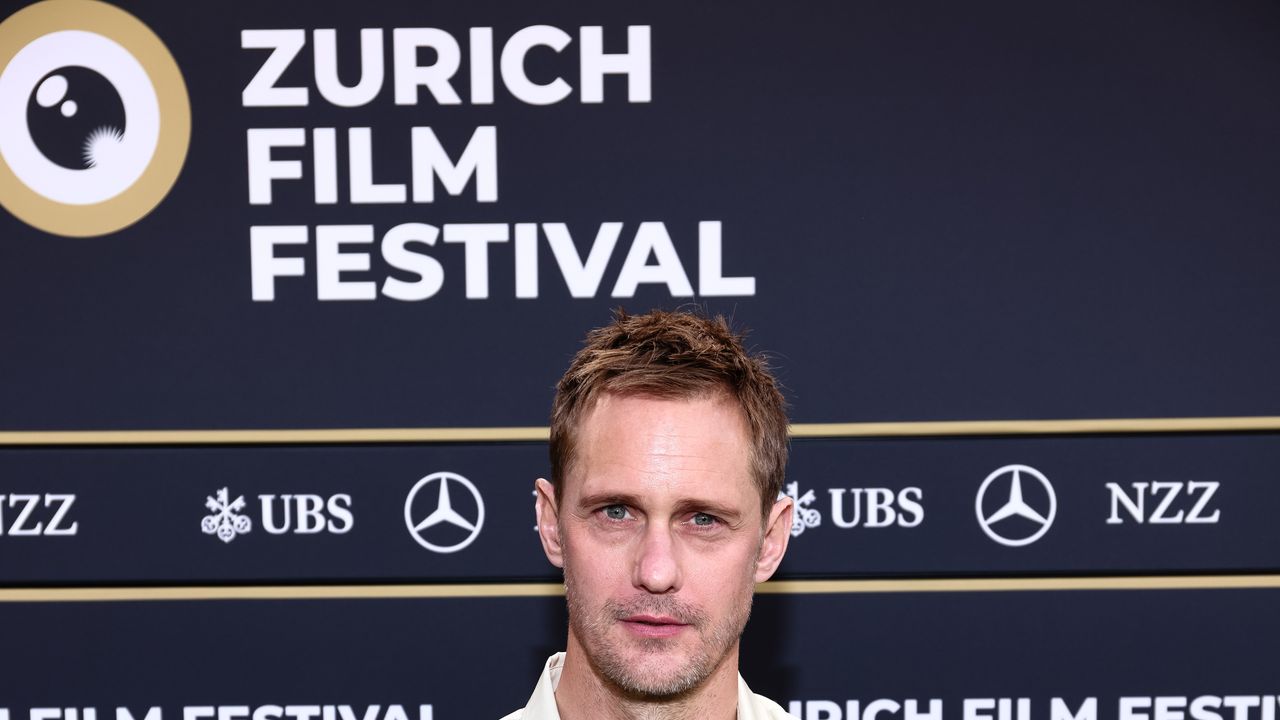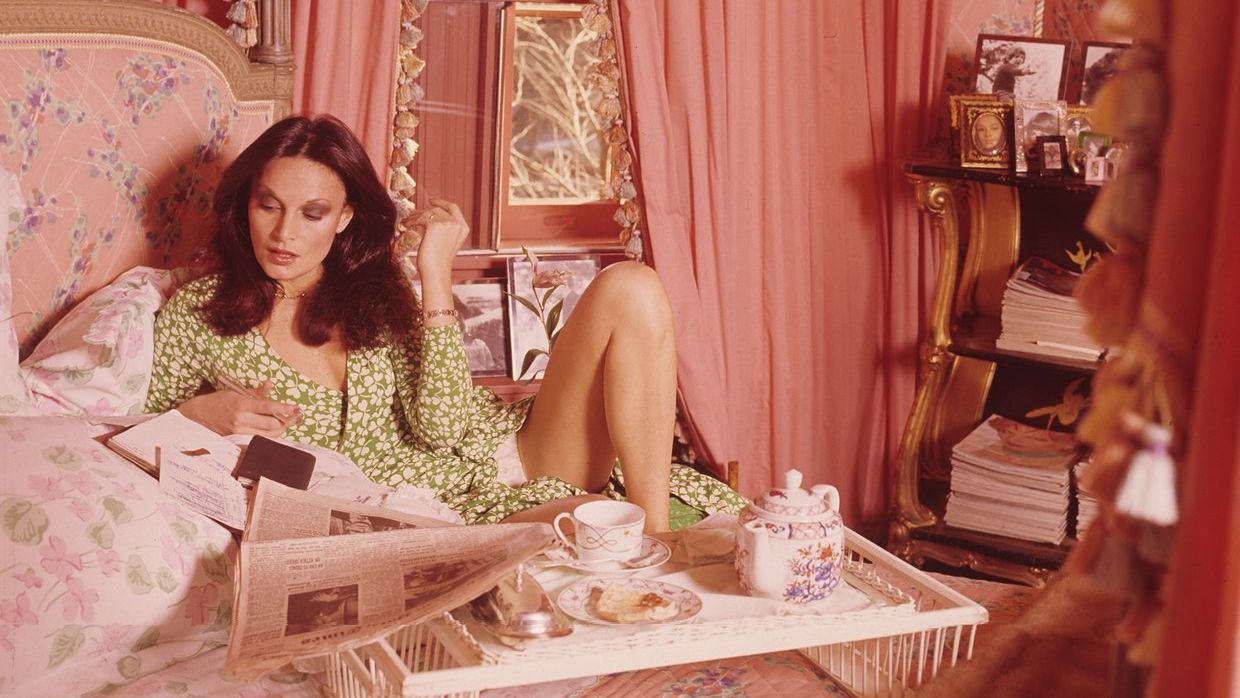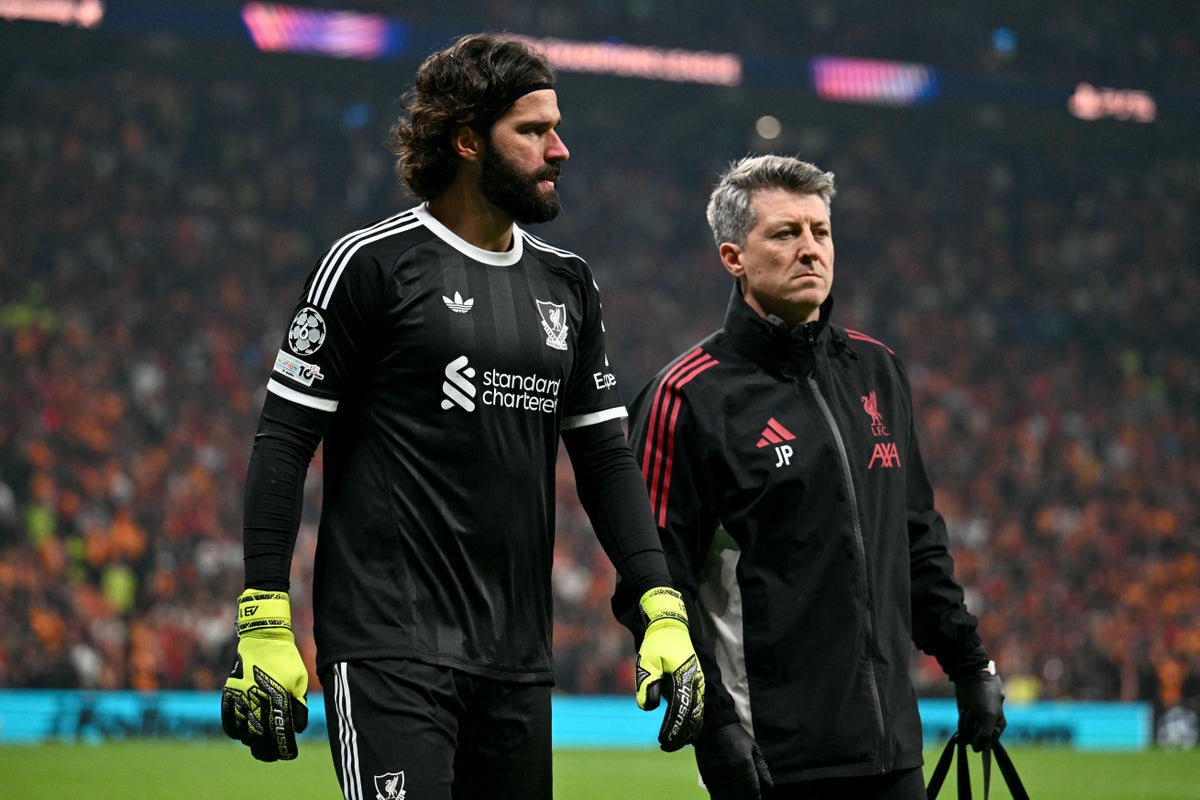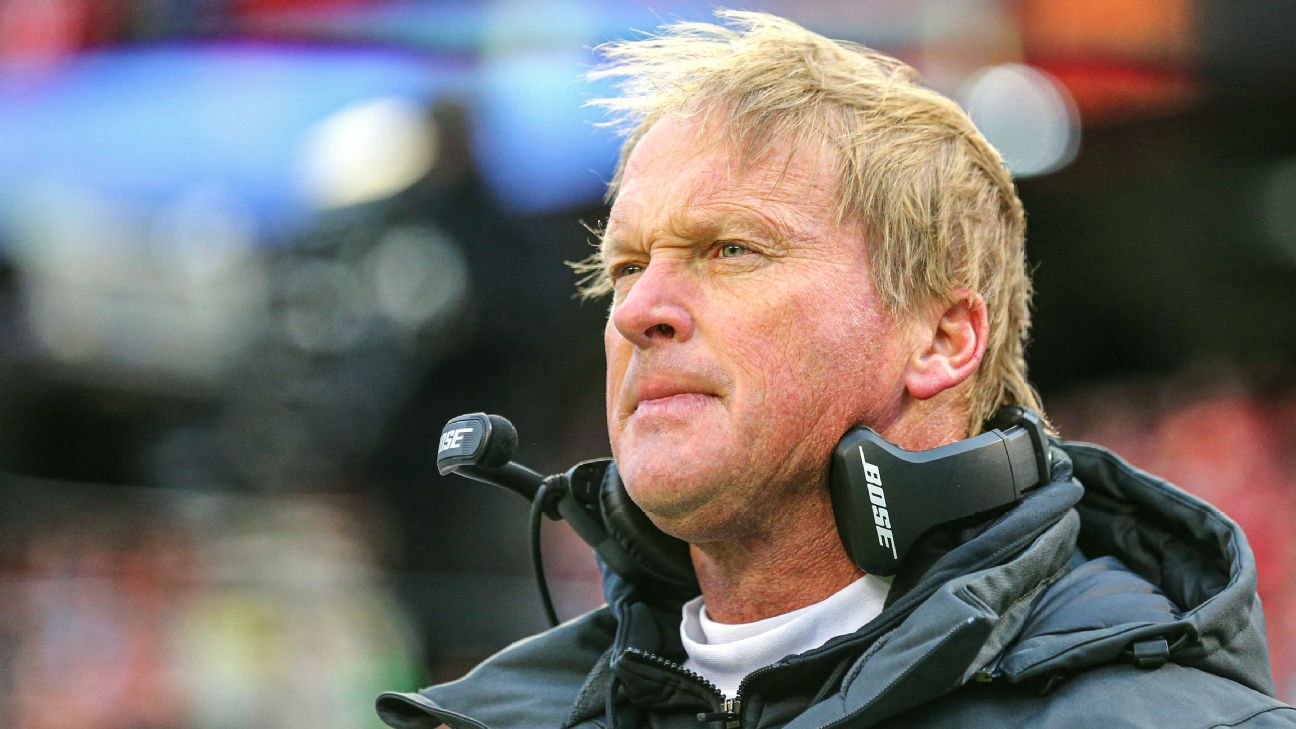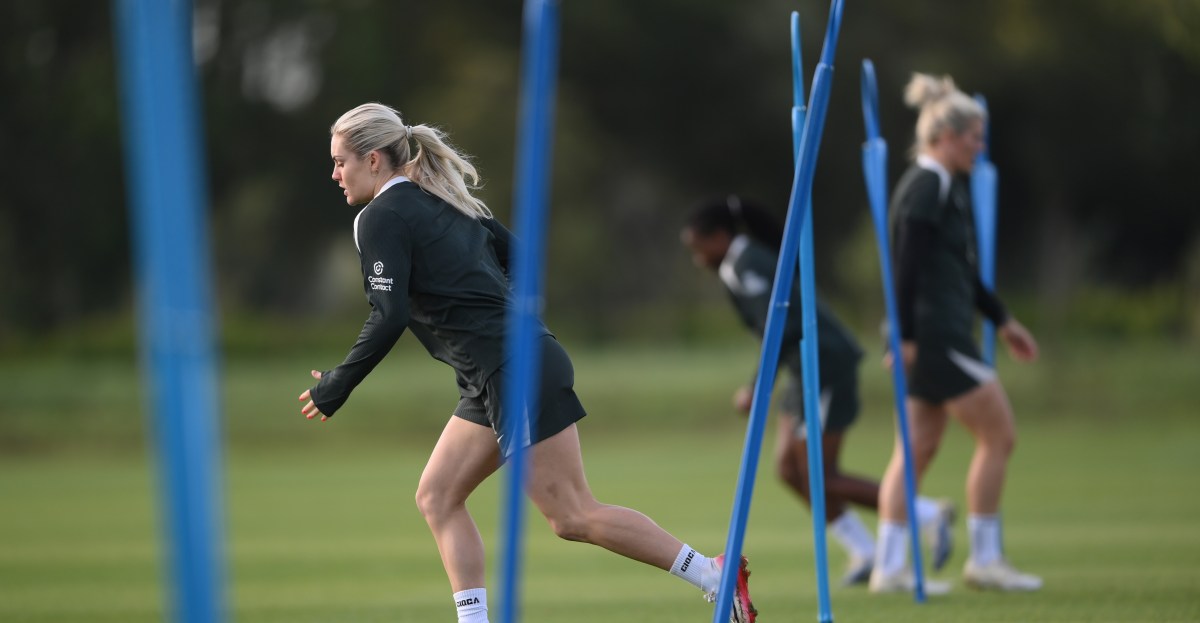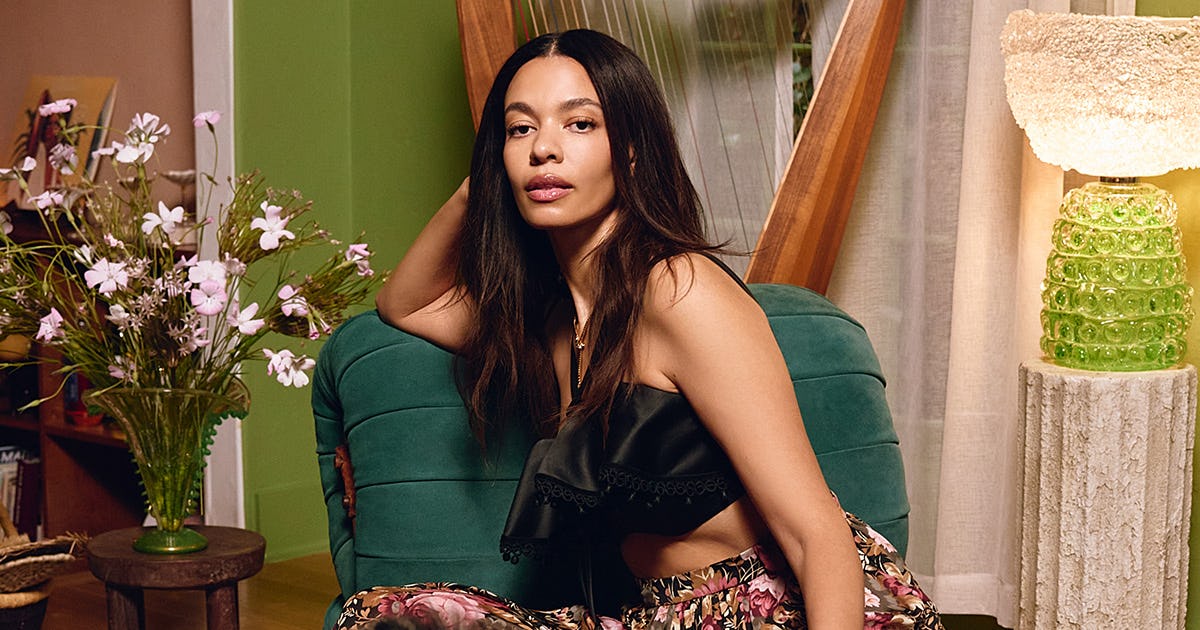
Breezy small talk can become an impossible challenge for someone like Aurora James. Recently, she was at a dinner party in Los Angeles and found herself seated next to actor-screenwriter Rachel Sennott. They exchanged pleasantries, and eventually Sennott asked James the seemingly innocuous question: So, what do you do?
For James, that’s a bit like asking what’s for dinner — well, how much time do we have, and what are we cooking with? That night, she went for the microwave-ready answer. So unless Sennott Googled her dinner companion afterward, she’ll probably remember James as the bubbly, cherub-voiced shoe designer.
“One of my friends was like, ‘That’s what you say you do?’” James says with a laugh. She told her friend: “I mean, yeah. How much do we want to get into this?”
Even half a decade ago, “shoe designer” would have undersold James’ stature. In 2013, she founded her brand Brother Vellies, offering hit shoes inspired by traditional African designs and made in collaboration with artisans from the continent. Today, James might be best known today for starting the Fifteen Percent Pledge Foundation. In 2020, in the early days of the pandemic, and as protests around the murder of George Floyd roiled the country, James called on corporations to commit 15% of their shelf space to Black-owned companies. (The number is commensurate with the Black population in the United States.)
“The pledge,” as James refers to it, quickly found support among some of the world’s largest businesses, including Bloomingdale’s, Nordstrom, and Sephora, and its success earned James a Vogue cover (painted by artist Jordan Casteel) and an award from the Council of Fashion Designers of America. In total, more than 28 retailers have taken the pledge, resulting in $14 billion in revenue for Black-owned brands, according to the organization, now a 501(c)(3) nonprofit.
The success of the pledge led to James to starting Parity Collective, an investment initiative for founders of color within the private equity firm VMG Partners. “I was on the phone this morning with a team of bankers who don’t know anything about me outside being an investor,” James says. She’s also the author of the memoir Wildflower (which traces her journey from high-school dropout with an arrest record to model and eventual fashion star) and recently launched a newsletter (because it’s 2025). So, yeah, you can see why shoe designer is her fall-back answer.
Not too long ago, James was hoping to step back from the day-to-day of the Pledge foundation. The energy she’d poured into it was paying off, and other projects needed attention. “I’ve had the Fifteen Percent Pledge for half of Brother Vellies’ life,” James says. “It’s been a sacrificial lamb.” She no longer designs four collections a year for Brother Vellies, as the traditional fashion calendar typically demands. However, the reelection of Donald Trump and the ensuing political climate — including a pointed backlash to diversity, equity, and inclusion (DEI) initiatives — made James reshuffle her priorities and hold onto her executive director title.
“I’m not OK with buying new things if it’s something that I really am not going to want to have in my wardrobe potentially for the rest of my life.”
“There was a world where I really hoped that we would be in a different administration right now,” James says. Even over Zoom, her charisma is apparent: When she talks, you can practically see the clapping emojis in the crisp silences between her most salient points, and she reflexively widens her eyes — big, inviting — to punctuate the shock of what she’s trying to convey (even if it’s just that she used to attend Pilates six times a week). “I wouldn’t have to be fighting so hard to keep some of these equity pathways open and explaining to people what a diverse meritocracy is.”
But with the chaos comes clarity, and James — as hard as it is for her to pin down a job description — is clear-eyed about her role: someone with the power and privilege to create change.
(+)
(+)
James was right about one thing: For her, it does all start with a shoe. She still wears vellies — the namesake of her brand, and a kind of footwear favored by South African farmers since the 17th century — all the time. Their design is thought to have originated with the indigenous Khoisan people of Southern Africa. Then came European settlers, who “fell in love with it and did their colonial thing,” James explains, which is how the world came to know them as desert boots. The shoe is everything James loves about fashion: artisanal, durable, cosigned by the might of history. After falling in love with them while traveling through Africa in her 20s, James poured her savings into making her first collection; today, she still sources local materials and works with South African craftspeople to produce the shoes in small batches.
“It was so weird to me, because in what world would I buy a tank top? I already have a tank top. Like, that’s insane.”
James grew up in Toronto and credits her mother, who worked as a landscape architect, with her own creative streak. “Her connection to nature and natural materials largely shaped a lot of my taste,” James says. And over the years, James’ taste has been as much of a draw as her shoes. In the 2010s, I purchased multiple pairs of Brother Vellies’ viral, decadently thick $35 Cloud Socks, and I remember walking into her former Greenpoint, Brooklyn, shop feeling like I had stumbled into an art gallery where every object had a novella-length backstory. There’s now a section of the Brother Vellies website called The Bodega, which carries trays, fans, and other trinkets guaranteed to make you feel 20% cooler. Years ago, I picked up a “Teresita sculpture,” a terracotta reproduction of a woman’s face made by famed Mexican potter José García Antonio, who lost his vision and still reconstructs his wife’s face from memory in these sculptures. (See? At least 20% cooler.)
Though her work with the pledge has kept her from devoting as much time as she’d like to Brother Vellies, the company is profitable, and James reports steady year-over-year growth. Time and space away from creating have also helped her connect with another cause on her mind. “The plus side that’s really exciting is that the less I’ve been designing, the more I have been able to grapple with my core concern about fashion,” James says, “which is that we are sort of creating too many things at too quickly of a clip.”
The morning we spoke, James was strolling down Abbot Kinney, the shop-lined hub of Venice, when she spotted a pair of sweatpants in a store’s window. She loved them and needed a new pair anyway, so she walked in to buy them. That’s when the salesperson did something, in James’s eyes, unforgivable: She tried to sell the designer a tank top. “I was like, ‘Whoa!’ It was so weird to me, because in what world would I buy a tank top? I already have a tank top. Like, that’s insane.”
(+)
(+)
The tank top was a breaking point. The salesperson was just doing her job, sure, but in James’ eyes, she was yet another entity trying to sell her something. Like all of us, James is inundated with Instagram ads and TikTok influencers pushing more and more products. The irony of her strong reaction isn’t lost on James, whose career path “manifests consumerism,” she says. But the experience once again snapped into focus her greater mission: trying to find a way to use consumerism for good.
“I’m not OK with buying new things if it’s something that I really am not going to want to have in my wardrobe potentially for the rest of my life,” James says. (She’s still kicking herself for not buying the DSquared2 Ice Skate heels from 2011, which definitely pass her test.) She wants her own brand to reflect this approach: James specifically doesn’t mark down prices to ensure she can always pay her artisans fairly and buy the best quality materials.
“I really hoped that we would be in a different administration right now. I wouldn’t have to be fighting so hard to keep some of these equity pathways open.”
At the end of the day, James believes, our dollars count. She was recently coaching a brand founder she works with who was reconsidering a launch with Target; to pull out would have damaged the upstart brand’s business, but the founder was no longer sure Target — which has been facing boycotts after discontinuing some its DEI policies — was still in line with her values. (In 2021, James accused Target of ripping off the Fifteen Percent Pledge’s branding for its own investment push into Black-owned businesses, which Target denied.) Not all problems James is asked to weigh in on are so high stakes: A friend consulted her about returning his leased Tesla following CEO Elon Musk’s disruptive stint in the White House.
When it comes to the future of the Fifteen Percent Pledge, what she’s most passionate about right now “is making sure that the girls are OK — that our community doesn’t get too disenfranchised, tired, and desensitized to everything that’s going on right now,” James says. “Of course, it’s really overwhelming and we need to metabolize those feelings and still understand that collective action is possible and can help shape this country.”
Despite the discouraging climate, there is good news. James reports that not a single company that took the pledge has wavered. Sephora, which James highlights as a particularly strong supporter, continues to give a $100,000 grant to a Black-owned beauty business every year.
Shelf space may be the pledge’s lasting legacy, but James still finds the most meaning in the community she’s built. She responds to hundreds of DMs a week (and clearly cares about their input — she recently asked her followers what color couch she should get). She engages with people at every level, whether they’re buying something through Etsy because of a recommendation in her newsletter or starting their business because of funding through Parity Collective.
“I have to believe that it’s a relay,” James says. “I have to believe that the baton was handed to me and someone else is going to take it. I have to believe there are thousands and millions of women across the country who have their own baton and are running their own races.”
Photographs by Ethan Gulley
Hair: Sabrina Porsche
Makeup: Britt Sullivan
Production: Danielle Smit
Talent Bookings: Special Projects
Photo Director: Jackie Ladner
Fashion Market Director: Jennifer Yee
Social Director: Charlie Mock
Editorial Director: Angela Melero
SVP Creative: Karen Hibbert
#Aurora #James #Brother #Vellies #Fifteen #Percent #Pledge #Fast #Fashion

